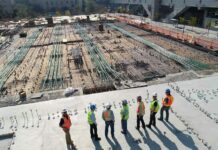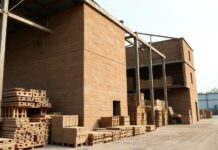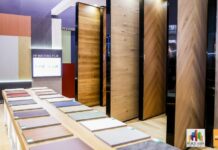There are many industries that benefit from plastic injection moulding at the moment, including pharmaceutical, medical, telecommunications, electronics, food and beverage, consumer products and transportation. Just like all these sectors, the construction industry has also risen as a major consumer of injection moulded plastic products over the years. This has prompted many businesses in the sector to partner up with an injection moulding company in order to develop the various products required in their daily operations.
There are several reasons why plastic injection moulding has become a preferred manufacturing process for creating products used in building and construction. First of all, this solution comes with a wide range of applications which allows for the development of a large variety of items and components necessary for construction. Then there are the numerous benefits that injection moulding brings to the table, providing a competitive advantage over other types of plastic production processes. We’re going to explore all these aspects one by one in order to explain the prevalence of plastic injection moulding in construction.
Applications
The construction industry employs a wide variety of plastic products, many of which are manufactured using the injection moulding method. So, let’s take a look at the main product categories that rely on this production process.
Tools and equipment
A lot of the tools and equipment used in the construction industry are either partially or completely made from plastic. Injection moulded plastic tools are ideal for the construction environment since they are robust, can withstand extensive wear and tear and extreme use conditions, are easily customizable, adapt to different construction requirements, and they are easy to clean and use.
Electronics
Construction work often requires the integration of a variety of electrical components that have to follow specific installation requirements. Injection moulded plastics are considered excellent insulators, which makes them perfect for producing parts and components used in electrical equipment such as cables, electric housings, printed circuit boards, circuit breakers, plugs and sockets.
Climate control
Plastic’s insulation properties also make it suitable for creating climate control products like heating, ventilation and air conditioning systems or cooling equipment. From HVACs to heat pumps and solar panels, injection moulded plastic parts are present in many of these systems.
Storage solutions
Storage is another important aspect of construction work and plastics can help in this area as well. Thanks to their sturdiness and durability, injection moulding large plastic products can be used to provide adequate storage for construction items, including bins and boxes, shelves, racks and containers.
Fittings
The plastic injection moulding process is also used frequently in the production of domestic fittings. Anything from pipes and hardware to windows and doors profiles, roof membranes, and design features can be produced through this versatile manufacturing method.
Benefits
Injection moulding ensures top-quality plastic products for the construction industry due to the numerous advantage it provides, as follows.
Durability
Injection moulding uses specialized machines and techniques to manufacture high-quality plastic products and components that are sturdy, reliable and will not rust or rot like items made from other types of materials such as metal or wood. Therefore, the end products will be able to stand the test of time, providing a major advantage for construction companies.
Convenience
The plastic products resulting from the injection moulding manufacturing process are also lightweight, which means they are easier to move around and store. This ensures convenience during transportation and storage and also reduces the costs associated with these activities.
Versatility
The injection moulding process is able to create a wide variety of plastic items, in all sorts of shapes and sizes that can fit the exact specifications and needs of constructors. From very small pieces designed to integrate into larger components to complex parts that require extreme accuracy, injection moulding is suitable for all types of applications within the construction industry.
Mass-production
Construction companies can resort to injection moulding solutions when they require high-volume manufacturing to create a large number of similar plastic components and products, or when they need bespoke items for a very specific project.
Cost-effectiveness
Plastic injection moulding is also a very cost-effective manufacturing process. First of all, plastic is a relatively low-priced material that’s also robust, versatile and widely available compared to other types of materials used in construction. Secondly, the moulding equipment can be used repeatedly to produce a large number of plastic items, maintaining high levels of quality and accuracy over time. Thirdly, injection moulding ensures fast production times which also helps to keep costs down.
Insulation
Due to their excellent insulation properties, plastic injection moulded products can be used as they are in a variety of construction settings where insulation is required, thus eliminating the need to add other types of materials to maintain adequate temperature levels.
Sustainability
Plastics have been widely criticized for their contribution to global pollution. However, a lot of the plastics used to produce injection moulded parts such as Polyethylene Terephthalate (PET) and High-Density Polyethylene (HDPE) are highly recyclable, helping enhance sustainability levels in the construction sector. What’s more, the surplus plastic resulting from injection moulding can be reused to manufacture other components or sent to a recycling facility.
Aesthetic appeal
Last but not least, let’s not forget about aesthetics – an aspect that plays a very important role in the construction industry. Plastic products produced via injection moulding are often a lot more attractive than items made of other types of materials. The ability to render fine details with great precision in order to create high-quality items with clean-looking features is one of the main advantages that injection moulding provides. Apart from looking great, these products come in a wide range of colours and are also easier to clean and maintain in good condition.
There’s no denying that the plastic injection moulding process offers a variety of advantages and applications for construction, meaning that its prevalence in this sector is likely to increase in the years to come as more innovations enter the field.




























